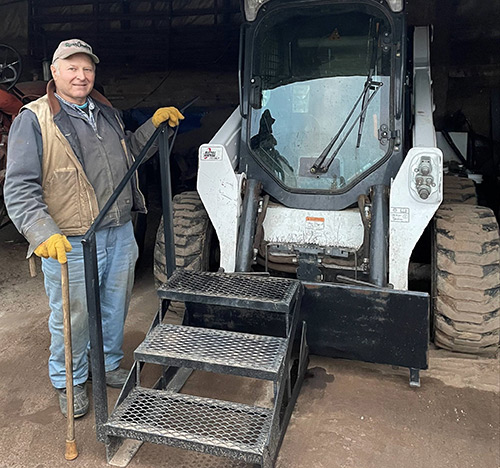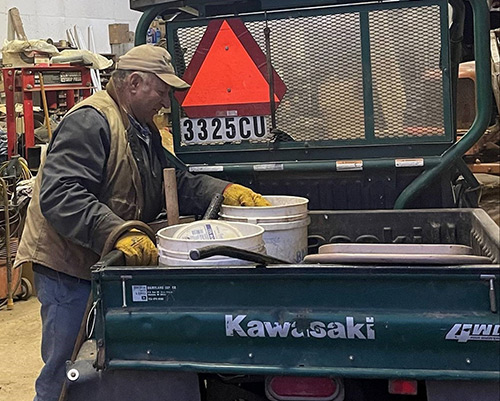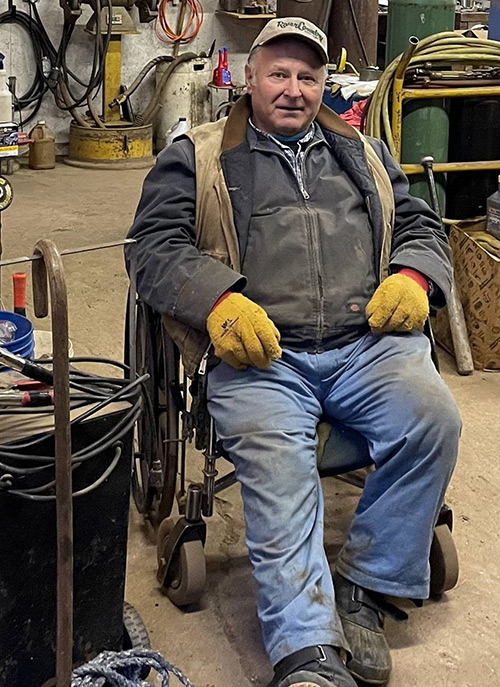Outdated or Unsupported Browser Detected
DWD's website uses the latest technology. This makes our site faster and easier to use across all devices. Unfortunatley, your browser is out of date and is not supported. An update is not required, but it is strongly recommended to improve your browsing experience. To update Internet Explorer to Microsoft Edge visit their website.
December 3, 2021

PHILLIPS, WI – In early 2009, a healthy 51-year-old Scott Cebery was operating his family's beef cattle farm in rural Phillips, Wisconsin, logging in the winter, and doing some excavation work in the summer.
After experiencing sudden pain in his lower back and weakness in his legs, he was admitted to the hospital where an MRI showed a virus had caused inflammatory changes to his spinal cord, resulting in a diagnosis of transverse myelitis.

"It paralyzed me from the waist down, I couldn’t feel anything," Cebery said.
With therapy, he was able to regain enough strength in his legs to get around with a walker, but he knew his life would never be the same. Today, the 64-year-old walks with a cane and wears leg and ankle braces to get around his century-old farm.
Yet despite these challenges, he maintains a herd of 100 cattle and 185 crop acres used to harvest hay, barley, and corn for the herd.
"It's something I always liked to do as a little kid as I followed my dad around; I always planned that I would farm," he said. "You got to do what you like to do, and this is it and at this stage in the game, I'm not going to do something different."
Cebery credits his ability to continue to do the work he loves to a friend who told him about the Wisconsin Department of Workforce Development's Division of Vocational Rehabilitation (DVR). The division's programs offer a wide range of employment services to Wisconsinites with disabilities including farmers and other business owners seeking to maintain their existing business operations.
Over the last five years, DVR has helped approximately 100 Wisconsin farmers with disabilities successfully achieve their employment goals by offering a full spectrum of services including onsite farm assessments, vocational guidance and counseling, self-employment planning, and assistive technology services including assessments, customization, repair, and training.

Cebery first applied for DVR services in fall 2009, when he worked with his licensed DVR counselor to develop an Individualized Plan for Employment to find the best strategies to return to work around the farm.
"I was hoping to keep doing what I was doing and knew I was good at it," he said.
DVR contracted with AgrAbility of Wisconsin, a collaborative partnership between University of Wisconsin Extension and Easterseals Wisconsin, to conduct an onsite assessment and identify assistive technologies that would allow Cebery to successfully work on his farm.
Following the assessment, DVR helped Cebery secure a Kawasaki Utility Terrain Vehicle, allowing him to easily move around the farm to monitor and repair fence lines for his livestock, inspect fields, and move animals between rotational grazing paddocks.
"Without it, I would have really been in a spot, it's hard to carry much of anything and walk," he said. "That machine set me free to do a lot of my work, I can scoot around here and take care of whatever I need to take care of."
Cebery also had a small skid-steer loader he used every day to haul heavy equipment and feed and perform other duties around the farm. The machine operated with the use of foot pedals, which Cebery was no longer able to use given the lack of sensation and strength in his legs. DVR assisted Cebery in trading in his old machine to obtain a newer Bobcat Skid-Steer Loader that included hand controls he could easily manipulate.

"Now I can produce something with that machine, with the other one I couldn't because the loader was too fast and I couldn't operate it slowly with my feet," Cebery said. "In order to use the old machine, I needed to move my whole body to get the pedals to do something, and that was too difficult."
When Cebery sought out DVR services again in 2019, DVR provided a new onsite assessment and determined he would benefit from additional assistive technologies, including an automatic door opener to his workshop allowing him to easily get in and out of the building where he stores his machinery. The assessment also identified the need for detachable steps and a rail for his Bobcat loader, which he now uses to get in and out of the machine more safely.
Cebery admits it was initially tough for him to seek help as many farmers, like himself, are independent and don't ask for help that often.
"I didn't want to cave in to help too much, I kept thinking it all would get better, and I wouldn't need all of the help," he said. "But it didn't go that way, and I did need support."
For farmers with disabilities, Cebery highly recommends that they get in touch with their local DVR office and begin the eligibility process for DVR services.
"It was a positive experience the whole way through, I never had any trouble working with anybody," he said. "Everybody had great ideas of things I had never really thought of, which really surprised me."
Individuals with a disability that makes it difficult to get or keep a job can apply for DVR services using the online referral form or contact DVR's administrative office at 608-261-0050 or toll-free at 800-442-3477.
Additional services for Wisconsin farmers are available through the Wisconsin Department of Agriculture, Trade and Consumer Protection (DATCP) Farm Center. With decades of agriculture experience, Wisconsin Farm Center staff answer questions and connect farmers to resources. To learn more, visit the DATCP Farm Center page or call toll-free at 800-942-2474.
Wisconsin's Department of Workforce Development efficiently delivers effective and inclusive services to meet Wisconsin's diverse workforce needs now and for the future. The department advocates for and invests in the protection and economic advancement of all Wisconsin workers, employers, and job seekers through six divisions – Employment and Training, Vocational Rehabilitation, Unemployment Insurance, Equal Rights, Worker's Compensation, and Administrative Services. To keep up with DWD announcements and information, sign up for news releases and follow us on LinkedIn, Facebook, Instagram, X, and YouTube.
Wisconsin’s Department of Agriculture, Trade and Consumer Protection staff educate, regulate, and provide resources to consumers and businesses across Wisconsin. The Wisconsin Farm Center provides services such as the financial consulting and transition planning, mediation, Farmer Wellness Program, and connects farmers to resources such as the DVR program through DWD. Sign up for DATCP email updates or follow the DATCP Facebook, Twitter, LinkedIn, and Instagram to keep up with the latest news.